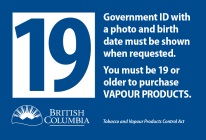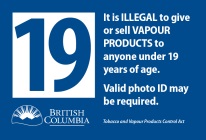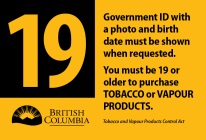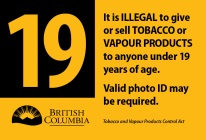Information for Vapour Product Retailers
|
Definition of a vapour product |
|---|
|
A vapour product (commonly known as an e-cigarette) is defined as:
An E-substance is:
Both the device and the E-substance are subject to restrictions on sale, display, promotion and use. |
Requirements for the sale, display and promotion of vapour products in British Columbia
What is New?
Prescribed health hazards and regulated activities
Under the Public Health Act, a health hazard as a thing, condition, or activity that will or is likely to endanger public health. In addition, the Public Health Act enables health hazards to be identified and addressed in regulation. A health hazard can be a defined condition, thing or activity either associated with injury or illness, or which fails to meet a certain standard relating to health, injury or illness.
Prescribing certain types of vapour products as health hazards allows public health officials to better manage the risk of harm they pose, particularly to youth. Under the E-Substances Regulation the following will now be health hazards:
- E-substances that contain non-therapeutic nicotine
- E-substances that do not contain nicotine, nicotine salts or cannabis
Vapour products with contain “non-therapeutic nicotine” are health hazards under the Health Hazards Regulation. Non-therapeutic nicotine refers to nicotine which is not in the form of a drug for which a prescription is required or a product, such as nicotine gum or lozenge, which is intended to be sued or consumed for tobacco reduction or cessation purposes.
Under the E-Substances Regulation, the sales of these health hazards are a regulated activity. New restrictions on the sales of specific e-substances will be applied to retailers and business owners.
New Requirements
Effective immediately
-
All E-substances that do not contain nicotine, and those that contain both nicotine and cannabis, will be prohibited for sale
-
Cannabis-only vapour products continue to be available for sale through authorized cannabis retailers
-
Retailers cannot sell any E-substances that contain only flavoured chemicals (i.e. substances that do not contain nicotine, or nicotine salts or cannabis)
-
All advertising of vapour products that can be seen, accessed, or heard by youth is prohibited. This includes places such as store windows and transit hubs
-
Business owners must notify the Ministry of Health of their intention to sell restricted E-substances at least 6 weeks prior to their first sale by submitting a Notice of Intent through the BC E-Substances Reporting Application
-
Business owners must report the products they wish to sell to the Ministry of Health at least 6 weeks prior to their first sale by submitting a product report, and a manufacturing report, if applicable
-
Business owners are required to use the BC E-substances Reporting tool to submit your notification and reporting requirements
As of September 15, 2020
- Flavoured restricted E-substances can only be sold at age-restricted sales premises. All-ages premises may only sell tobacco flavoured e-substances
- Retailers selling restricted E-substances must ensure that the E-substances they sell meet the requirements with respect to labelling, packaging, volume, concentration and flavour
- All retailers must comply with notification and reporting requirements under the E-Substances Regulation
There are two types of sales premises in which vapour products may be sold and new requirements for the types of products that each retailer-type can sell:
- Age-restricted sales premises – where minors (those under 19 years of age) are not permitted to enter and where customers must show proof of their age before buying products. Age-restricted stores include specialized vapour product stores. Tobacco flavoured E-substances and other flavoured restricted E-substances may be sold in an age-restricted sales premises. However, no retailer may sell the flavours listed in Schedule 3 of the federal Tobacco and Vapour Products Act
- All-ages sales premises - where minors (those under 19 years of age) can enter. These sales premises include gas stations, convenience stores, and any other retail establishment where youth are permitted. Only restricted E-substances that taste or smell of tobacco may be sold at all-ages sales premises. No other flavours are allowed. The purpose of this restriction is to limit the range of choice in vapour products in stores where youth have access
For a complete breakdown of the new requirements for retailers under the new vapour product regulations see the B.C.’s E-Substances Regulation: Retailers’ Guide (PDF, 1.3MB).
If you are ready to submit your Notice of Intent to sell E-Substances, you can find the reporting link on the Notice of Intent to Sell E-Substances and Reporting Requirements page.
Only adults can buy vapour products
Any adult over the age of 19 can purchase a vapour product.
Retailers must ensure that they sell vapour products only to people over 19 years of age. Only government-issued identification (e.g. a passport, driver’s license or identification card with a photograph) can be used to confirm a person’s age.
It is illegal to give or provide any vapour product to someone under the age of 19. If you suspect someone is providing vapour products to minors, please contact enforcement staff at your local health authority.
Restrictions on the display and promotion of vapour products in stores
A key goal of the Tobacco and Vapour Products Control Act and Regulation is to prevent youth from being encouraged to use vapour products by exposure to advertising and displays of products and merchandise.
- If your store is an all-ages sales premise, then you must ensure that the vapour products and any advertisements for vapour products are not visible to minors in your store. Effective immediately, an amendment to the Tobacco and Vapour Products Control Regulation restricts all public advertising and displays from any place, inside or outside, where minors can see, access or hear the advertisement. This includes any objects like mugs or hats that promote brands or manufacturers of vapour products. Within your store, you can inform customers that you have vapour products for sale, using basic signs with general information such the price range of single use or refillable products. The information must be small black letters that on a white background and the page cannot be larger than a standard letter size page
- If your store only allows adults (i.e., ages 19 and over), then you may have vapour products and their promotions out on display inside the store. However, you must ensure that people looking into the store from outside cannot see the vapour products or their advertisements
Any vending machines that sell vapour products must be in adult-only venues.
Vapour products advertisements outside of retail stores and in public places
Effective immediately, an amendment to the Tobacco and Vapour Products Control Regulation has expanded the restriction on public advertising of vapour products. Retailers, manufacturers, distributors, wholesalers or persons acting on behalf of any of these entities, must not advertise vapour products in any place, inside or outside, where minors (those under 19 years of age) can see, access or hear the advertisement.
Display requirements for vapour products in duty free stores
Duty free stores are treated the same as all other retail stores in British Columbia. Duty-free stores that sell vapour products can either stop youth from entering their premises or place these products in age-restricted areas.
In the case of displays of these products in duty free stores, federal legislation does not take precedence over provincial legislation. These laws will continue to be enforced in duty free stores by enforcement officers from health authorities.
Testing vapour products before purchasing
Adult-only stores can show customers how to use vapour products and test products that they wish to buy, with the following conditions:
- Retailers/employees can hold and activate vapour products only for the purpose of showing customers how to use the product
- Retailers/employees cannot use the vapour product
- A customer can sample an E-substance in the store if:
- They are testing or sampling products that they intend to purchase and consume off-site; and
- Only two customers can sample vapour products at any time in a retail store
- Retailers must take steps to ensure the second hand vapour does not escape to adjacent premises or public areas
Stores that cannot sell vapour products
There are a number of public places in B.C. that cannot sell vapour products. Stores in the following locations cannot sell vapour products:
- Any publicly owned or leased hospital or healthcare facility
- Any publicly owned or leased post-secondary buildings that are used for education, research or student services
- Any municipal or regional district buildings used for athletics, recreation or library services
- Any building owned or leased by government or crown corporations or agencies
Signs required for the sale of vapour products
Under the Tobacco and Vapour Products Control Regulation, anyone selling vapour products must post two mandated warning signs at your cash till or point of sale:
Signs required when only vapour products are sold
|
1. One sign faces the customers and informs them they must be at least 19 years of age to buy vapour products. |
 |
|
2. A second sign faces the retailer/employee of retailer and reminds them that only those 19 or older with approved identification can buy vapour products. |
 |
Signs required for the sale of both tobacco and vapour products
| 1. One sign faces the customers and informs them they must be at least 19 years of age to buy tobacco and vapour products. |  |
| 2. A second sign faces the retailer/employee of retailer and reminds them that only those 19 or older with approved identification can buy tobacco and vapour products. |  |
Only the signs provided by the Ministry of Health can be used. Please contact your local health authority to receive your point of sale signs.
Enforcement
Enforcement officers in the regional health authorities are responsible for enforcing the Tobacco and Vapour Products Control Act, the Tobacco and Vapour Products Control Regulation and the E-Substances Regulation.
Their work is guided by a progressive enforcement model that include: education and awareness, verbal warning, letter warning, ticketing and administrative hearings. Their goal is to ensure everyone is meeting the requirements of the legislation through education and progressive enforcement options. Many times, an enforcement officer will work with retailers to educate them on the requirements and help retailers comply with the new laws. Enforcement officers may also use minor test shoppers as part of their inspection routines.
Penalties
If an enforcement officer believes a retailer or their employee has contravened the Tobacco and Vapour Products Control Act or Regulation, or the E-Substances Regulation the officer has two main options:
- A ticket can be issued: tickets vary from $345 or $575 depending on the contravention. Fine amounts for contraventions of the Tobacco and Vapour Products Control Act and Regulation are provided under the Violation Ticket Administration and Fines Regulation (Schedule 2), B.C. Reg. 89/97.
-
As of December 13, 2021, ticketing for contraventions of the E-Substance Regulation (ESR) are in force. Retailers could be subject to fines in the form of a ticket for non-compliance with the regulation. Enforcement of the Tobacco and Vapour Product Control Act (TVPCA), the Tobacco and Vapour Products Control Regulations (TVPCR) and the ESR continues to be the primary responsibility of Tobacco and Vapour Product Enforcement Officers employed by Regional Health Authorities.
Following the amendment to the Violation Ticket Administration and Fines Regulation, police (including those listed as designated constables under the Police Act) now have authority to ticket for all contraventions of the TVPCA, TVPCR, and ESR.
Conservation officers now also have the authority to ticket for contraventions of the TVPCA and TVPCR only. See table below.
Tobacco and Vapour Products Contraventions and Fine Amounts (PDF, 137.2KB)
- A request can be made for an administrative hearing: an administrative hearing is usually for more serious violations and allows both the retailer and enforcement officer an opportunity to provide evidence in a hearing. If a contravention is found under the Tobacco and Vapour Products Control Act or the Tobacco and Vapour Products Control regulation, adjudicators can set monetary penalties and/or suspend tobacco sales authorizations and prohibit the sale of vapour products. Monetary penalties range up to $5,000, and suspensions of tobacco sales authorizations and prohibition of sale of vapour products range up to 180 days.
If an enforcement officer has reasonable grounds to believe that an offence has been committed under the new E-Substances Regulation, the officer may issue an appearance notice to a person which directs them to appear in court. Upon a successful conviction, a judge will determine the appropriate sentence based on the facts of the case, and the sentencing and penalty provisions under the Public Health Act.
Please note that a health officer authorised under the Public Health Act, can take additional enforcement actions that the officer believes is reasonably necessary. This includes issuing orders to a person to comply with the Public Health Act and E-Substances Regulation and to take actions to prevent harms in relation to a health hazard.
